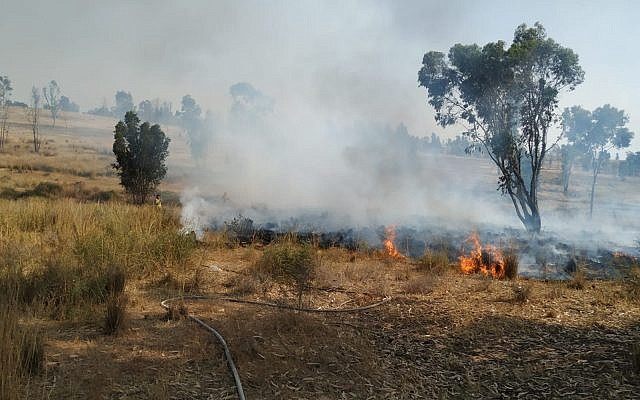 Islamic Jihad chief says Gaza groups can fire 1,000 rockets a day at Israel
Islamic Jihad chief says Gaza groups can fire 1,000 rockets a day at Israel
Arson balloons spark three fires inside Israel; 7,000 Palestinians protest along Gaza border with hundreds rioting, 11 wounded
The head of the Palestinian Islamic Jihad in Gaza warned Friday that terror groups in the Strip have the ability to fire 1,000 rockets a day into Israel for a month and have some missiles that can carry a half-ton explosive warhead.
Speaking in an interview with the Lebanese Hezbollah’s Al-Manar television station, Ziad Nakhaleh said that his group and Hamas were improving their capabilities on a daily basis, giving the large warheads as an example.
“In the last round of fighting we restrained ourselves and only fired 700 rockets into Israel over two days,” Nakhaleh said, adding that they also held back from targeting some cities deep in Israel.
“In the next round of fighting, we will not only fire at Tel Aviv, but at all the cities, whatever may happen,” he said, claiming they could sustain a rate of fire of 1,000 rockets per day for a full month.

A damaged house after it was hit by a rocket in the village of Mishmeret, north of Tel Aviv on March 25, 2019. (Jack Guez/AFP)
A tense calm has prevailed since the weekend of violence at the beginning of the month, during which Hamas and Palestinian Islamic Jihad fired nearly 700 rockets at Israel.
A ceasefire deal was brokered as Israel sought to end the fighting before its Independence Day celebrations and the hosting of the Eurovision song contest.
Since then Israel has sought to ease or impose restrictions depending on the level of violence emanating from the Strip, particularly arson balloons.
Israel announced Wednesday it had tightened restrictions on Palestinian fishing off the Strip after more balloons fitted with firebombs were floated from the enclave into its territory.
The zone it allows Gaza fishermen was reduced to a maximum of 10 nautical miles from 15, COGAT, the Israeli Defence Ministry unit that oversees such regulations, said. The move came just days after Israel restored the fishing limit to the 15 nautical mile maximum after a previous cut in response to fire balloons last week.
Three fires were started Friday by the incendiary devices, including a blaze in the Be’eri Forest near the Gaza border. Fire fighters were working to get it under control.

Firefighters work to extinguish a blaze in the Eshkol region of southern Israel that was sparked by a balloon-borne incendiary device from the Gaza Strip on May 22, 2019. (Eli Cohen/Fire and Rescue Services)
Since last March, incendiary balloons have caused fires that destroyed thousands of acres of farmland and nature reserves in southern Israel, in particular in the areas bordering Gaza.
The balloons were launched during the weekly Friday protests and riots along the Gaza border.
Some 7,000 Palestinians gathered along the border in five places Friday, with some rioting and throwing rocks and explosive devices at Israeli troops who responded with tear gas and occasional live fire.
The Hamas-run Gaza health ministry said 11 people were wounded.

Palestinian rioters throw back Israeli tear gas canisters during clashes with Israeli forces during Nakba Day protests east of Bureij in the central Gaza Strip on May 15, 2019. (Thomas Coex/AFP)
Al-Nakhala’s comments about launching missiles at Israel come a day after Hamas leader Yahya Sinwar thanked Iran for providing his terror group the rockets it used to strike deep into Israel and warned the Jewish state that Tel Aviv would be struck again in response to any offensive against the Gaza Strip.
“Iran provided us with rockets, and we surprised the world when our resistance targeted Beersheba,” Sinwar said in a live TV address, referring to rockets fired at the southern Israeli city some 50 kilometers (30 miles) from Gaza.
“Had it not been for Iran, the resistance in Palestine would not have possessed its current capabilities,” Sinwar said.
The Hamas leader then went on to warn that if Israel “resumes its aggression,” his group would strike Tel Aviv and other cities with twice as many rockets.

People inspect the damage at a house in the southern Israeli city of Beersheba on May 5, 2019, after it was hit in a rocket strike from Gaza. (Ahmad Gharabli/AFP)
Israel has long charged Iran with trying to arm Palestinian terror groups in Gaza and maintains a blockade of the Strip to try and stop the import of sophisticated weapons systems.
Iran has also supplied tens of thousands of rockets to the Hezbollah terror group in Lebanon.
No comments:
Post a Comment